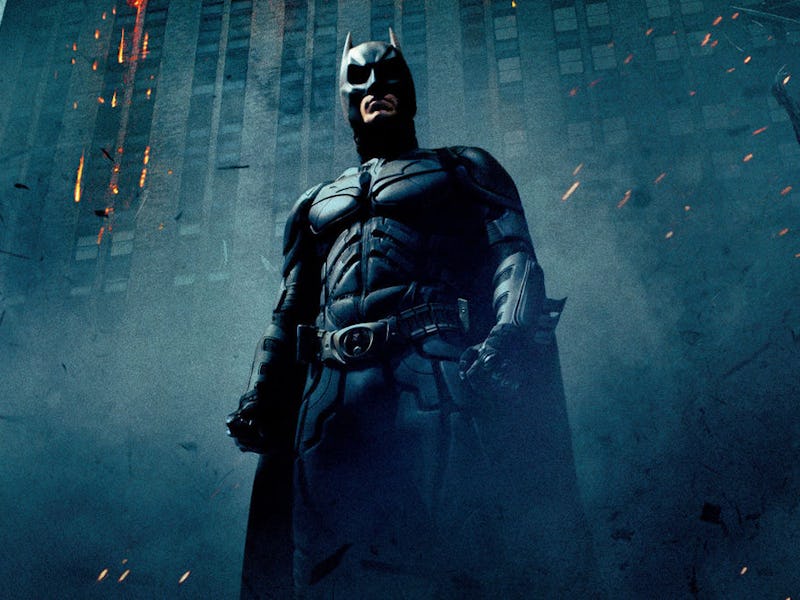From Terrorism to Technology, Batman’s Fears Have Evolved With the Times
In 2008, Batman was a political allegory whether you wanted him to be or not.

The Dark Knight occupied a vague political space when it opened 15 years ago on July 18, 2008. Director Christopher Nolan had long avoided “specific messages” or themes with his Batman movies, but admitted that he tried to imbue them with concerns about “the threat to civilization that we take for granted.” That intention came through in The Dark Knight, which has been hailed as a quintessential post-9/11 blockbuster through the film’s unflinching depiction of its terrorist villain, and its moral quandaries over whether the ends justify the means. A decade and a half later, The Dark Knight’s greatest threat has evolved from terrorism to technology and homegrown tyranny.
The Dark Knight equates the Joker to a terrorist more than once in dialogue, and he’s a self-identified “agent of chaos,” but that’s just the beginning. Even when Batman (Christian Bale) resorts to violence in the interrogation room — barring the door and acting out his own PG-13 version of the “enhanced interrogation techniques,” or torture, at Abu Ghraib prison in Iraq — it has no effect on the Joker because he can’t be “bullied, reasoned, or negotiated with.”
The interrogation leads to another ticking time bomb scenario, which costs Rachel Dawes (Maggie Gyllenhaal) her life. By the end, Batman is so desperate to end the Joker’s reign of terror that he turns every cell phone in Gotham City into a microphone and mapping device. More than just James Bond gadgetry or his usual utility-belt tricks, Batman becomes the surveillance state through a bank of blue monitors, where bat-like sonar imaging allows him to have eyes everywhere.
With this technology, which he developed under the pretense of a “government telecommunications contract,” Batman can remotely activate a phone even in a high-security building in Hong Kong. Lucius Fox (Morgan Freeman), supplied Bruce Wayne with a sonar tech prototype, but when he sees what Batman’s done with it, Lucius realizes the gravity of what he’s unleashed.
Lucius calls the technology “unethical” and “dangerous” as he watches Batman monitor all of Gotham’s citizens to ferret out the Joker. This parallels the real-life warrantless wiretapping of American citizens under George W. Bush’s administration and the NSA’s Terrorist Surveillance Program, but it’s also as if Lucius anticipated how phone-enabled privacy invasions might one day move beyond big government. When news broke in 2018 that Cambridge Analytica had been harvesting personal data from Facebook users to aid political campaigns, it felt like the next logical step.
Harvey’s idealism is bluntly broken down over the course of the film.
Phones have other dangerous applications in The Dark Knight, which arrived the year after Apple released its first iPhone. Joker’s jailbreak turns the idea of the increasingly smart phone from a figurative extension of one’s hand to an object of body horror, sewn into a man’s stomach before it explodes. Now Elon Musk’s Neuralink is looking to begin FDA-approved human trials on implanted brain-computer interfaces, or smartbrains. Bruce Wayne isn’t the only billionaire whose technological pursuits come with possible hazards.
Where The Dark Knight moves beyond terrorism and into a broader vision of incipient tyranny is in the figure of its other tragic villain, Harvey Dent (Aaron Eckhart). With his perfectly dimpled chin, the blonde-haired, blue-eyed Dent is the kind of district attorney who recommends that failed assassins “buy American” guns. The Dark Knight lifts him up as “Gotham’s white knight,” a paragon of decency “in an indecent time,” the kind of figure America needed.
Dent is supposed to be a public servant, but he’s a hypocritical idealist. At dinner, he likens Gotham to Rome, arguing, “When their enemies were at the gates, the Romans would suspend democracy and appoint one man to protect the city.” Rachel sees the tyrannical implications in this, countering, “The last man that they appointed to protect the republic was named Caesar, and he never gave up his power.” Fulfilling his own prophecy, Dent lives long enough to see himself become the villain after he loses Rachel, and the Joker — the smiling face of terror personified — cozies up to his bedside and corrupts him.
Pictured: ISIS, apparently.
By the end, the war on terror leaves Dent scarred and out for revenge, serving only his own interests. Batman plays the true public servant, though his quick dismantling of his surveillance system once the Joker is caught upholds the fantasy that a self-appointed hero can cross the line yet know when to stop. Christopher Nolan has also been accused of muddled politics, but The Dark Knight may have simply sponged up nascent real-world fears, giving such vivid expression to them on film that it wound up intersecting with offscreen events.
Barack Obama’s 2008 presidential campaign brought a red, white, and blue face of hope, in a poster akin to the “I believe in Harvey Dent” poster used in viral marketing. It was soon followed by a less flattering Obama image, as critics sought to associate him with Ledger’s Joker. Even Obama’s own policy included Joker comparisons; in 2016, The Atlantic reported that he’d compared ISIS to the villain. No one, it seems, can escape Batman’s long shadow.
In 2023, the cautionary tale about a capitalist society that might “tear itself apart through fear,” abuse technology, suspend democracy, and fall like Rome feels timelier than ever. The Dark Knight spoke to the social anxieties of its day, but as the Joker professes, it was also frighteningly ahead of the curve.
This article was originally published on